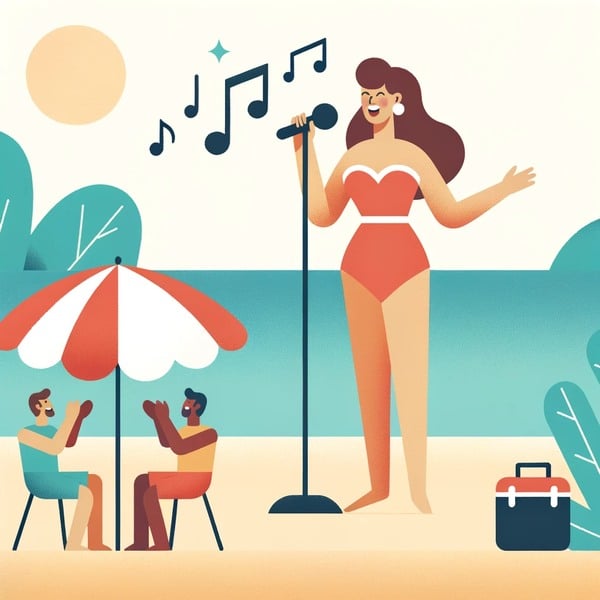This list closely examines some of the most peculiar, weirdest, unusual, stupid, and craziest laws in Florida, from singing in swimsuits to tying giraffes to telephone poles. Get ready for a dose of humor and head-scratching as we delve into the quirky regulations that make Florida one of a kind.
Singing in a Swimsuit
According to the state’s laws, it is against the law to sing in public while dressed in a swimsuit. You may ask why is it illegal to sing in a swimsuit in Florida? This bizarre regulation might have been enacted to prevent indecency in public, but it remains unclear why the specific garment of a swimsuit was targeted.
While it might seem strange today, this regulation was probably implemented to maintain a certain level of decorum in public spaces, especially in beach areas and public pools where swimwear is commonly worn. The combination of singing, which naturally attracts attention, with the relative lack of clothing that a swimsuit provides could have been seen as overly disruptive or indecent behavior, hence the establishment of this law.
The specific focus on swimwear makes this law particularly interesting. Swimwear, especially during Florida’s hot summer months, is commonplace. The law doesn’t appear to apply to other forms of attire, leading to questions about why swimsuits were singled out. It’s possible that this rule was a reaction to certain behaviors or events that took place in the past, though the exact origins of the law remain unclear.

Despite its existence, enforcement of this law in modern times is highly unlikely. As societal norms and attitudes have evolved, laws like this are often seen as outdated and are typically not enforced. Instead, they remain on the books as an interesting piece of historical trivia, a testament to the changing times and shifting attitudes towards public behavior.
Still, if you’re planning a beach trip in Florida and feel the urge to break into song, it might be wise to cover up your swimsuit first – to be safe.
Parking an Elephant in a Bathtub
This quirky law prohibits residents from parking an elephant in a bathtub. One can only speculate as to why such a law was necessary, but it is a reminder of the strange and obscure laws that still exist in Florida’s books.
Tying a Giraffe to a Telephone Pole
Another one of Florida’s strange laws makes it illegal to attach a giraffe to a telephone pole or a street lamp. Perhaps this regulation was created to protect the animal’s welfare, but the specifics remain a mystery.
Skateboarding with a License
In Florida, it is illegal to skateboard without a license. This law seems at odds with the typical freedom associated with skateboarding, and it’s unclear what the licensing process entails or why it is necessary.
This law is unexpected, especially considering the inherent freedom and spontaneity usually associated with skateboarding as a leisure activity and form of transportation.
The necessity for a license to engage in an activity like skateboarding may seem perplexing. One possibility is that it’s an attempt to regulate and control public spaces, like drivers require a license to operate vehicles on public roads. It’s conceivable that the law was enacted to ensure the safety of both skateboarders and pedestrians or to reduce the potential for property damage.
The specifics of the licensing process are not readily apparent. It’s unclear what requirements or criteria skateboarders must meet to obtain a license, whether there are age restrictions, or if there’s an associated fee. Furthermore, it’s uncertain whether this rule is uniformly enforced across the state or if enforcement varies depending on the city or county.
The stipulation that a license is needed to skateboard contrasts the general perception of skateboarding as an accessible, inclusive sport. Skateboarding has long been seen as a symbol of youth culture and rebellion, with its roots in street culture. This regulation might be seen as a way of regulating a pastime often associated with freedom and autonomy.
Yet, like many other unusual laws, it’s doubtful that this rule is actively enforced today. Over time, societal norms and laws evolve, and some older regulations may not align with contemporary perspectives. They are a fascinating snapshot of a particular moment in our legal and cultural history. While they may no longer actively influence daily life, they provide intriguing insights into past societal norms and attitudes.
Catching Fish with Bare Hands
According to state law, catching fish with your bare hands is illegal. This strange regulation might have been put in place for safety reasons, but it is unclear why this method of fishing is considered particularly dangerous.
This method, often referred to as noodling or handfishing, is a traditional form of fishing in some rural of the United States and around the world. Still, in Florida, it’s technically against the law.
This prohibition might initially seem peculiar, especially considering Florida’s reputation as a haven for diverse fishing activities. However, there might be several logical reasons to why this rule was established.
Safety could be a significant factor. Noodling typically involves reaching blindly into underwater holes and crevices where fish might hide, which could lead to encounters with dangerous aquatic creatures or injuries from sharp rocks or debris. Also, noodling often occurs in murky, fast-moving bodies of water, which carry inherent risks.
This law could be aimed at preserving certain fish populations. Catching fish by hand is a very direct and efficient method, which, if widely practiced, might deplete certain fish stocks more rapidly than traditional fishing methods. Therefore, the ban might exist to protect vulnerable fish populations and ensure the sustainability of Florida’s aquatic ecosystems.
Despite these potential justifications, it’s uncertain how often this law is enforced or why handfishing is considered particularly harmful in Florida compared to other states where it’s allowed. Like many unusual laws, this is a unique glimpse into the rich tapestry of local regulations and cultural practices. Whether it’s a historical relic or an actively enforced regulation, it certainly adds to the color and character of Florida’s legal landscape.
Shaving in the Street
Florida law prohibits residents from shaving in the street. This odd law might have been enacted to maintain public hygiene, but it is unclear why such a specific activity was targeted.
Whistling for a Lost Canary
Before 7 a.m., it is illegal to whistle for a lost canary in Florida. This peculiar law seems to preserve the peace in residential areas, but the specifics remain a mystery.
Breaking More than Three Dishes
According to state law, breaking more than three dishes daily is illegal. This unusual regulation might have been enacted to prevent excessive noise or to promote thriftiness, but the specific reasoning is unclear.
Selling Your Children
Although it may seem unfathomable, selling your children in Florida is illegal. This law serves as a reminder that such exploitation is not tolerated, but the need for it to be specified in state law highlights the disturbing realities of the world.
Hanging Laundry on Sundays
Florida law forbids residents from hanging laundry on a clothesline outside on Sundays. This strange regulation might have been implemented to maintain the sanctity of Sundays, but it remains unclear why laundry was specifically targeted.
These strange laws are an example of the idiosyncrasies and unpredictability of the legislative process, and they raise questions about the motivations that led to the enactment of those laws.

